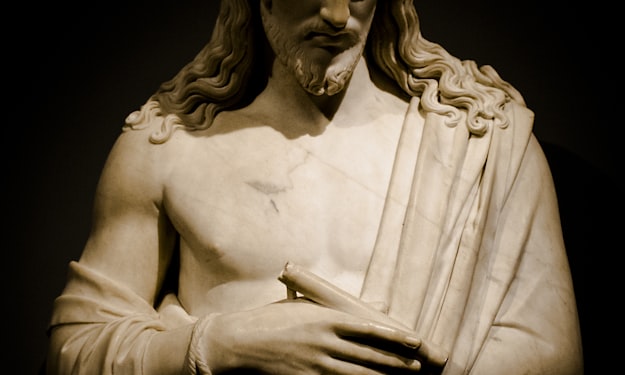
Ricardo de Moura Pereira
Bio
I love to read writing and watch many documentaries in history, to have more knowledge in all science.
I work with digital marketing, and create articles for newspapers and marketing content.
Stories (32/0)
A horror story untold
A writer moves into an old house in the countryside in search of inspiration for his next book. He discovers that the house once belonged to a famous horror author who died mysteriously decades ago. The writer decides to explore the attic, where he finds an old typewriter covered in dust. He feels a strange attraction to the machine and decides to use it to write his book.
By Ricardo de Moura Pereira4 months ago in Horror
The most beautiful beaches of Brazil
The best and most beautiful beaches for some may not be for others. There are always doubts as to whether this or that beach is missing from the ranking, or whether some shouldn't be in the selection. The fact that a beach is visited on a sunny day at low tide or on a cloudy day at high tide can totally change a tourist's opinion.
By Ricardo de Moura Pereira6 months ago in Earth
The year of the artificial intelligence era
Artificial Intelligence (AI) is a field of study that has gained increasing prominence in recent years. With technological advances and the growing need to automate processes, AI has become a fundamental tool for many areas, from industry to medicine.
By Ricardo de Moura Pereira7 months ago in Futurism
The Origin of Evil - A Philosophical Exploration
For many, religion plays an essential role in defining the origin of evil. In religious traditions, evil is generally associated with rebellion against God or the influence of evil forces. Dualism, present in religions such as Zoroastrianism and Gnosticism, suggests the presence of two opposing forces, one good and the other evil, vying for control of the universe. In Christianity, the concept of original sin associates the origin of evil with Adam and Eve's disobedience in the Garden of Eden, throwing humanity into a state of sin and separation from God.The notion of evil has been a constant challenge in the history of philosophy, questioning thinkers and academics throughout the ages. The search for the origin of evil is a complex journey that involves a wide range of approaches and theories, from religious approaches to psychological and philosophical analysis. In this article, we will explore some of the main views on the origin of evil and their implicatons for our understanding of human nature and morality.
By Ricardo de Moura Pereira8 months ago in Horror
The Middle Ages: an era of light and shadow
The Middle Ages, also known as the medieval era, was a complex period of history that spanned roughly from the 5th to the 15th century in Europe. It is commonly portrayed as a time of striking contrasts, where remarkable advances and significant challenges coexisted.
By Ricardo de Moura Pereira9 months ago in Education
The origin of the bible, how did it come about?
The Bible is a sacred book that has its origins in various sources and historical periods. It is composed of two large sets of texts: the Old Testament, which is shared with the Jewish religion, and the New Testament, which is specific to Christianity.
By Ricardo de Moura Pereira11 months ago in Confessions
The events of the dark ages
The Dark Ages refers to a historical period that occurred in Western Europe during the Middle Ages, following the fall of the Western Roman Empire. This era was characterized by a significant decline in intellectual, scientific, and artistic activities, resulting in a period of cultural stagnation.
By Ricardo de Moura Pereira11 months ago in Horror
Who was the god of the Canaanites?
In Canaanite mythology, the supreme god was called El or Il. He was considered the father of all gods and ruled over the Canaanite pantheon. Il was associated with the sky and the storm, and was considered the lord of the universe. In addition to El, there were other important gods in Canaanite religion, such as Baal, Astarte, and Anat, who played distinct roles in the mythology and religious practices of the ancient Canaanite people.
By Ricardo de Moura Pereira11 months ago in Education
But what is limbo for Catholic doctrine?
Limbo is a theological concept that was discussed and debated in Catholic doctrine for many years, but is now no longer considered an official belief of the Catholic Church. Limbo was considered an intermediate state after death for the souls of those who died without having committed mortal sins, but who were not baptized either.
By Ricardo de Moura Pereira11 months ago in Confessions
Adam and Eve, original sin, apple, truth or legend?
The story of Adam and Eve, original sin, and the apple are elements found in the biblical narrative of the book of Genesis. The interpretation of these events as truth or legend can vary according to each person's religious and cultural perspective. For many people of faith, especially those who follow Christianity, the story of Adam and Eve is seen as a fundamental truth that explains the origin of sin and the fall of mankind. According to this view, God created Adam and Eve in the Garden of Eden and put them to the test by forbidding them to eat of the fruit of the tree of the knowledge of good and evil. However, they disobeyed this command and were expelled from the garden, which resulted in the entrance of sin and suffering into the world.
By Ricardo de Moura Pereira11 months ago in Confessions
What was the exodus of the Jewish people?
The exodus of the people of Israel refers to an important event in the history of the Old Testament of the Bible. According to the biblical narrative, the Israelites, descendants of Abraham, Isaac, and Jacob, lived as slaves in Egypt for several centuries.
By Ricardo de Moura Pereira11 months ago in Education
Did the historical Jesus exist or was he a Roman hoax?
The historical existence of Jesus is widely accepted by most scholars and historians, both religious and secular. Although the life of Jesus is mainly known through the New Testament accounts of the Bible, there are also some references to him in non-Christian sources of the time.
By Ricardo de Moura Pereira11 months ago in Fiction













